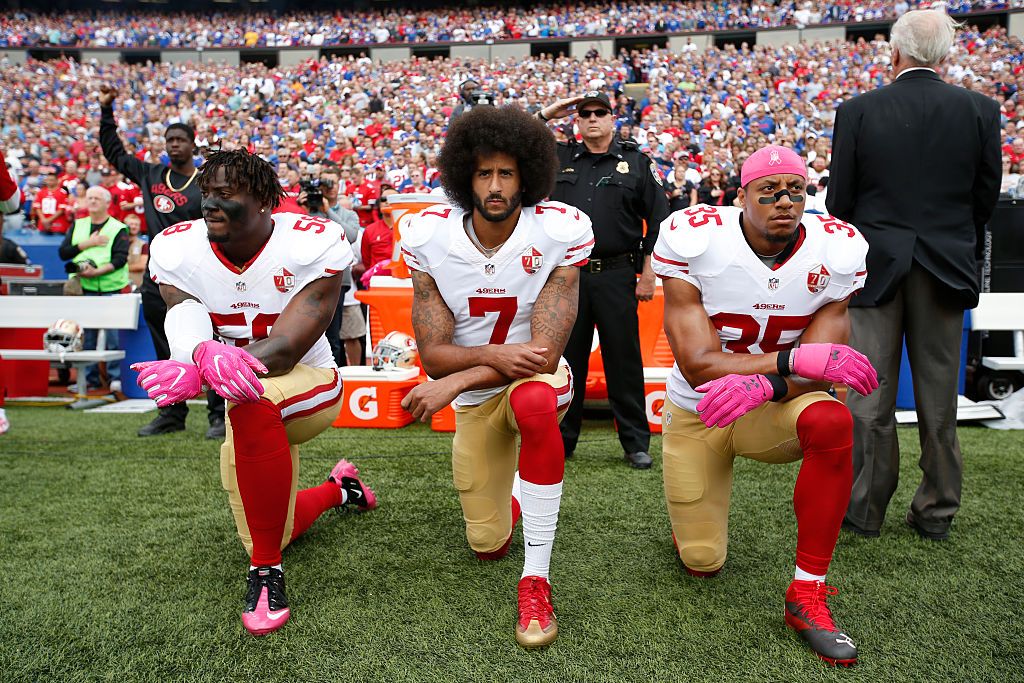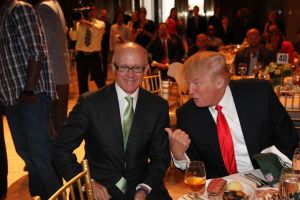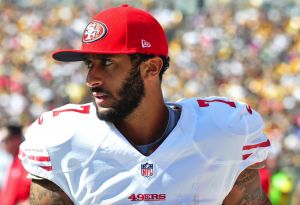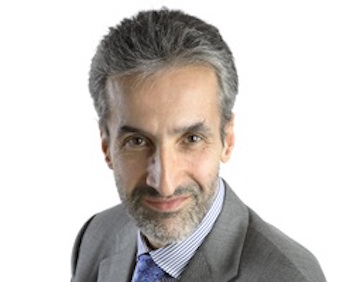
Eli Harold (#58), Colin Kaepernick (#7) and Eric Reid (#35) of the San Francisco 49ers kneel in protest on the sidelines during the national anthem prior to the game against the Buffalo Bills at New Era Field on Oct. 16, 2016. (Photo by Michael Zagaris/San Francisco 49ers/Getty Images)
Every year at about this time, I veer away from most of the liberal aesthetes with whom I mingle in the chattering classes. My newspaper reading and smart-phone clicking takes an unexpected detour from politics, opinion and arts. The pro-football season is approaching, and my guilty pleasure, my second religion, must be indulged.
— Samuel Freedman
By now, into my early 60s, I know all the logical reasons why my usual comrades refuse to share my passion. Football uses strategies and lexicon straight out of the military. Going back to Richard Nixon and Ronald Reagan, conservative politicians have appropriated the sport as their own. Elaborate presentations of the national colors by honor guards and flyovers by fighter jets have long been standard parts of pregame festivities. And now an epidemic of dementia and other brain injures among former players has left the National Football League with a medical scandal on its hands and a massive financial settlement on its balance sheet. Hardly any young parents of my acquaintance would let their child play organized tackle football, as I did in middle school.
So I don’t expect that the name Colin Kaepernick will mean a great deal to a great deal of you reading this essay. Or perhaps it will provoke some head-scratching, a game of charades with yourself, as you wait for that next clue that will lead you to the answer. But you ought to care about Colin Kaepernick. Colin Kaepernick matters, for reasons that have everything and nothing to do with football.
First, to answer the trivia question: Kaepernick is a quarterback who played six seasons for the San Francisco 49ers. He took his team to the NFL championship game twice and the Super Bowl once. Entering this year, Kaepernick’s contract expired and he became a free agent, meaning that he is able to be signed by any team in the league. Despite Kaepernick’s formidable record — and we’ll delve into the metrics a bit later — none of the 32 teams in the league has signed him, not even to be a benchwarmer.
To understand why, before we even go into the intricacies of the pro-football industry, it helps to think back to the “Hollywood 10,” figures like Dalton Trumbo and Ring Lardner Jr., left-leaning writers and directors who were blacklisted from the film industry during the McCarthy era. No movie executive could possibly have doubted the talent of such artists, but none would hire them for years. The association with an accused Communist, or someone who had been in the party during the Popular Front years, was bad for business. We like to think that such quarantines do not happen anymore, that gifted people are not deprived of their livelihood simply for having exercised their right to free speech.
— Colin Kaepernick
Almost exactly a year ago, on the night of Aug. 26, the 49ers were getting ready to play an otherwise desultory preseason game against the Green Bay Packers. When the “Star-Spangled Banner” was sung, and virtually everyone on the field and in the stadium stood, Kaepernick dropped to one knee in protest. Questioned by reporters after the game, Kaepernick said, “I’m going to continue to stand with the people that are being oppressed. To me, this is something that has to change. When there’s significant change and I feel that flag represents what it’s supposed to represent, and this country is representing people the way that it’s supposed to, I’ll stand.”
As an African-American, Kaepernick especially wanted to signal his support for the Black Lives Matter movement. In previous years, other black players in the NFL, as well as the National Basketball Association, had engaged in vocal or symbolic protests of the police killings of unarmed African-American men, particularly the slaying of Michael Brown in Ferguson, Mo.
Game after game during the 2016 season, Kaepernick knelt when the national anthem was played. He grew his hair into a billowing Afro that seemed like an evocation of the Black Power movement a half-century earlier. And meanwhile, as the quarterback of an abysmal team, he put up very respectable statistics and was selected to win an award by his teammates.
He was also roundly reviled by many pro football fans, including the president-to-be. After that preseason game, Donald Trump went on a conservative talk show in Seattle to call Kaepernick’s gesture “a terrible thing.” Trump went on, “Maybe he should find a country that works better for him. Let him try. It won’t happen.”
By one theory, the drop in the NFL’s television audience during 2016 resulted from mass disgust with Kaepernick’s actions. Considering that the hapless 49ers were only rarely on the major nationally televised games — those on Thursday, Sunday and Monday nights, and in the late-afternoon slot on Sundays — I found that kind of causality doubtful. In a broader sense, however, the polling firm Remington Research did find that about two-thirds of respondents opposed professional football players using “the NFL as a stage for their political views.” The number was significantly higher for men than women, whites than blacks, Republicans than Democrats, and conservatives than liberals.
The NFL, in fact, has been anything but a politics-free zone, as I pointed out at length in a New Yorker essay earlier this year. Donald Trump’s divisive campaign for president meshed with the overarching political culture of the league’s coaches and owners — one often at odds with its disproportionately black players. Such prominent current and former coaches as Mike Ditka, Rex Ryan and Bill Belichick, the latter of them a five-time Super Bowl winner, endorsed Trump. According to Sports Illustrated, the owners of six NFL franchises contributed $1 million apiece to Trump’s inaugural, while several others and the league itself made six-figure donations. One of the big givers, New York Jets owner Woody Johnson, was rewarded by Trump with the plum appointment of ambassador to Great Britain. Meanwhile, only one person in the league’s top echelons, head coach Mike Tomlin of the Pittsburgh Steelers, had contributed to Hillary Clinton’s campaign. Not surprisingly, Tomlin is African-American.

Donald Trump and Woody Johnson attend the New York Jets kickoff luncheon party at Cipriani Wall Street on Aug. 27, 2008 in New York. (Photo by Al Pereira/Michael Ochs Archives/Getty Images)
Now, if you will, fast-forward to the spring and summer of 2017, when the free-agent market in the NFL is going full swing. Politics aside, there is an argument to be made that Kaepernick probably cannot be a starting quarterback anymore. His recent seasons have not matched his best ones, in 2013 and 2014, and defensive coaches around the league have learned how to better control Kaepernick’s explosive running. But a team in the NFL cannot count on just one quarterback. There’s a truism, which might even be true, that a team is no better than its backup quarterback.
During the 2016 season, the statistics-crunching website Football Outsiders calculated that starting quarterbacks missed a total of 92 games with injuries or other causes. With there being two quarterbacks in each of the 256 regular-season games, the starter needed to be replaced almost one-fifth of the time. You don’t care about pro football? Imagine being a theater producer, director or diehard fan: Wouldn’t you want a high-quality understudy on hand if the odds were that your star would miss one performance of every five?
Pro football is full of data, and that data supports one clear conclusion: Colin Kaepernick easily meets the standards of a second-string quarterback. Just to keep it relatively simple, Kaepernick finished 17th among 30 starters in the league last year in the major computerized ranking. The Sporting News recently did a detailed comparison of Kaepernick to every backup quarterback for the 2017 season, and it showed him to be a better choice than many of them.

Colin Kaepernick. (Photo by Brook Ward/ flickr CC 2.0)
Yet Kaepernick barely received so much as an interview from any NFL team. The most revealing comment during the past few months came when the Baltimore Ravens were on the verge of signing Kaepernick. That decision would have made a lot of sense. The Ravens’ general manager, Ozzie Newsome, is African-American. The head coach, John Harbaugh, is the brother of Kaepernick’s coach during his best years in San Francisco. The Ravens’ starting quarterback, Joe Flacco, is recovering from a major injury.
Then, at a forum with Ravens fans, the franchise’s owner, Steve Bisciotti, opined that he hadn’t much cared for Kaepernick’s protests. And he didn’t really think Kaepernick could help the team win — an analysis that contradicted what Newsome and Harbaugh reportedly believed. Beyond such personal feelings, Bisciotti said he had to consider how sponsors and top-dollar ticket-buyers might react. “We’re very sensitive to it and we’re monitoring it,” he said cryptically. Needless to say, Kaepernick went unsigned and has remained unsigned.
— Michael Bennett, Seattle Seahawks
Certainly, any business owner ought to weigh the implications of hiring or firing a polarizing individual. The tender constitutions of the fan base, however, have never stopped NFL teams from employing players on their return from prison terms (quarterback Michael Vick and wide receiver Plaxico Burress) or after having turned state’s evidence and plea-bargained to a lesser count after being charged with murder (middle linebacker Ray Lewis). Perpetrators of domestic violence, such as running back Ray Rice and kicker Josh Brown, were protected from suspension by their teams or the league until the evidence proved impossible to rationalize or sweep away.
Incredibly — or, perhaps, fittingly — Vick and Lewis balanced some public sympathy for Kaepernick with chastisement. “Get back on the football field, and let your play speak for itself,” Lewis advised. Vick commented, “The first thing we got to get Colin to do is cut his hair. I don’t think he should represent himself in that way in terms of the hairstyle. Just go clean cut. Why not?” (To which Kaepernick tweeted a definition of the Stockholm Syndrome, in which kidnap victims develop affection for their captors.)
One of the most politically astute players in the NFL, defensive end Michael Bennett of the Seattle Seahawks, started the obvious: “There’s the elephant in the room why Kaepernick isn’t signed, and most people know why. I’ve said this several times, and I’m not afraid to say it: I think race and politics in sports is something people don’t want to hear about, nor do people want to be a part of.”
Around the league during this preseason, a few players like Malcolm Jenkins of the Philadelphia Eagles and Marshawn Lynch of the Oakland Raiders have raised a fist or sat during the national anthem. Overall, activism among NFL players is increasing. One of the hubs is the organization RISE, which was founded by Stephen M. Ross, owner of the Miami Dolphins.
But Ross is the woke anomaly among NFL owners. And outspoken players like Bennett, Jenkins and Lynch are the exception that proves the rule. As starters, indeed as stars, they are too valuable to be punished for their political opinions. Kaepernick falls on that vulnerable border — not essential enough to be permitted his public voice, but prominent enough to be made an example of.
The NFL season opens on Sept. 7, and the first game features the New England Patriots. The defending Super Bowl champions just happen to have an owner, head coach and quarterback — Robert Kraft, Bill Belichick and Tom Brady, respectively — who all support Trump. I do not mention that fact to suggest causation, only to note the deep roots of Trumpism among the NFL’s aristocracy.
On the day when white supremacists rallied in Charlottesville, Virginia, and one of their true believers killed an anti-racist activist and injured nearly 20 more by racing his car into a group of nonviolent marchers, Colin Kaepernick was paying close attention. He retweeted video and photos of the atrocity, as well as commentary from Linda Sarsour and Shaun King, among other progressives. Scrolling a bit farther down into Kaepernik’s Twitter account, I saw a photo of him wearing a T-shirt with a photo of Muhammad Ali and Malcolm X.
Great to see my Brother @JColeNC I appreciate you not just talking about helping the people, but actually going out and doing the work! pic.twitter.com/CXDvC8Rykp
— Colin Kaepernick (@Kaepernick7) Aug. 7, 2017
Ali, of course, was banned from professional boxing in 1967 for his refusal to be inducted into the military during the Vietnam War, even though a celebrity draftee like himself surely would have been given a cushy, public-relations sort of duty. “I ain’t go no quarrel with them Viet Cong,” Ali famously said, referring to the Communist guerillas. “No Viet Cong ever called me nigger.”
Nearly four years later, the Supreme Court restored Ali’s boxing license. Ali retained enough of his skill, even after the enforced hiatus, to twice more reclaim the heavyweight championship.
The clock incessantly ticks, however, on any professional athlete. And if you’re not a sports fan, think of what the passing years will do to your favorite ballerina. In one respect, the Hollywood Ten were fortunate. After a decade in professional exile, most were still able to return to writing and directing; the relevant cells were in their brains rather than their muscles.
Colin Kaepernick has brains enough, it is clear, and heart enough. But the flesh of a football star is evanescent, and at age 29, his blacklisting may well amount to a life sentence, for no crime other than having a social conscience.




